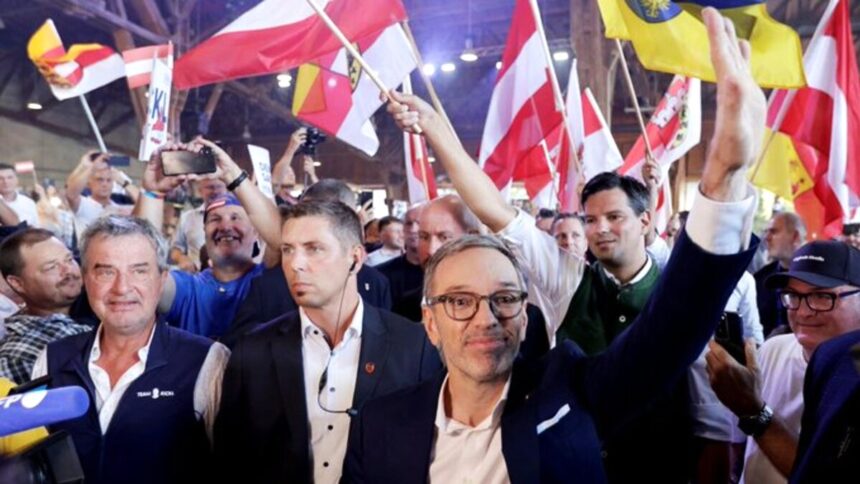Austria is gearing up for a critical general election this Sunday, with the far-right opposition Freedom Party (FPÖ) positioned to achieve a historic victory. If successful, this would mark the first time the FPÖ has topped the polls, following a checkered past filled with scandals and political upheaval.
The FPÖ: A Brief History
Founded in 1956 by former Nazis, the FPÖ has deep roots in Austrian politics. Originally advocating for Pan-Germanist ideals and seeking to reinstate National Socialism, the party has evolved over the decades. By the late 1990s, under the controversial leadership of Jörg Haider, the FPÖ gained significant traction, securing 27% of the vote in the 1999 elections and entering a coalition government with the conservative Austrian People’s Party (ÖVP).
However, the FPÖ’s journey hasn’t been without hurdles. In 2019, the party was embroiled in the “Ibiza-gate” scandal, leading to the resignation of then-leader Heinz-Christian Strache and the collapse of the coalition government. Despite these setbacks, the FPÖ has managed to maintain a prominent presence in Austrian politics.
Founded by Nazis, the far-right FPO is the current favourite in Austria’s general elections, set to be held on September 29.
— TRT World (@trtworld) September 28, 2024
Will Europe gain yet another anti-Muslim, anti-immigrant government? pic.twitter.com/6DKdvTpuyI
Current Landscape: Kickl’s Leadership
Herbert Kickl, the current leader of the FPÖ, has revitalized the party’s fortunes. Under his leadership, the FPÖ has effectively harnessed public anxieties surrounding migration, inflation, and government responses to the Covid-19 pandemic. Recent opinion polls show the FPÖ leading with approximately 27% of the vote, just ahead of the ruling ÖVP.
Kickl’s campaign has been characterized by nationalist rhetoric, promising to restore “freedom, security, and prosperity” to Austrians. However, his use of the term “Volkskanzler” (people’s chancellor) has sparked controversy, as it echoes language associated with Nazi Germany, unsettling many voters and critics alike.
Key Issues at Stake
The upcoming election is centered around several pressing issues:
Cost of Living and Economic Anxiety
With inflation rates climbing, Austrians are increasingly concerned about their financial stability. The FPÖ has proposed measures aimed at alleviating economic pressures, including tax breaks for young workers and lower taxes on savings.
Immigration and Security
Immigration remains a hot-button issue. The FPÖ advocates for stricter immigration policies, including what it terms “remigration”—the repatriation of individuals to their countries of origin. Kickl argues that this approach will enhance internal security, particularly in light of recent terror threats.
Energy Independence and EU Relations
Austria’s energy dependence on Russia has come under scrutiny, especially in the context of the ongoing war in Ukraine. The FPÖ opposes sanctions against Russia and insists that Austria should maintain its Russian gas supplies to avoid rising energy costs. This stance places the FPÖ at odds with mainstream parties, which advocate for reducing reliance on Russian energy.
Coalition Challenges Ahead
Even if the FPÖ wins the election, forming a stable government will be a formidable challenge. Political analysts predict that coalition negotiations could be complicated, given the reluctance of other parties to partner with the FPÖ, particularly under Kickl’s leadership.
Chancellor Karl Nehammer of the ÖVP has been clear about his unwillingness to work with Kickl, citing concerns over the FPÖ’s divisive rhetoric and conspiratorial views. This could lead the ÖVP to explore alternative coalitions with other parties, such as the Social Democrats (SPÖ) or even the Greens, thereby isolating the FPÖ.
Potential Scenarios
- FPÖ Comes First: If the FPÖ emerges as the top party, it may find itself in a precarious position, as the ÖVP may be reluctant to enter a coalition. The possibility exists for the ÖVP to form a government with the SPÖ, excluding the FPÖ altogether.
- FPÖ Comes Second: Should the FPÖ finish second, analysts suggest it might have a better chance of entering a coalition, especially if the ÖVP seeks to maintain power without partnering with Kickl.
- New Alliances: If the ÖVP and SPÖ form a coalition, it could lead to a historic three-party alliance, which would likely aim to keep the far-right from gaining influence.
Public Sentiment and Exclusion Issues
Public opinion about the FPÖ is deeply divided. Many Austrians express concern about the party’s extremist roots and its potential impact on democracy. Recent protests have highlighted this unease, with demonstrators calling for “Nazis out of parliament.”
Additionally, Austria’s restrictive citizenship laws exclude many long-term residents from voting, which has spurred grassroots movements advocating for electoral inclusion. Initiatives like the unofficial “Pass Egal Wahl” demonstrate the frustration of those unable to participate in the democratic process.
A Turning Point for Austria?
As Austria prepares for this pivotal election, the potential rise of the FPÖ could signal a significant shift in the nation’s political landscape. If Kickl’s party secures a leading position, it could reshape not only Austria’s domestic policies but also its standing within the European Union.
Political analysts stress that the election’s outcome will have far-reaching implications for Austria and the broader European political environment. With the FPÖ tapping into public discontent, the responses from other parties and the electorate will be critical in determining whether Austria veers toward a hard-right future or maintains a more centrist approach.
As citizens cast their votes, the world will be watching closely. The results of this election could either fortify the FPÖ’s influence in Austria or catalyze a robust coalition to counter its rise. The stakes have never been higher for Austria’s political landscape, and the implications for European unity and democracy are profound.
Read More : China Conducts Rare ICBM Test in Pacific Amid Rising Tensions
